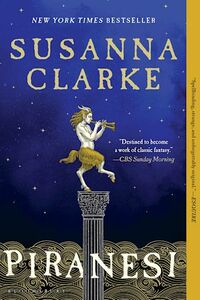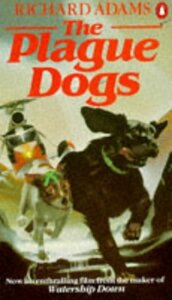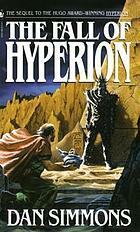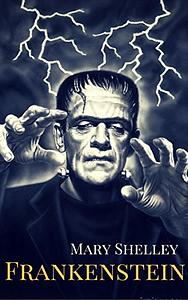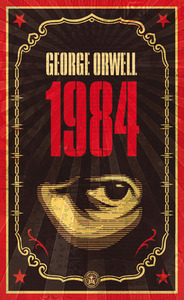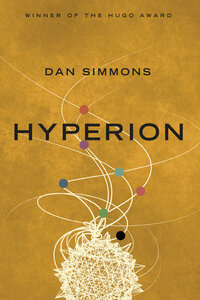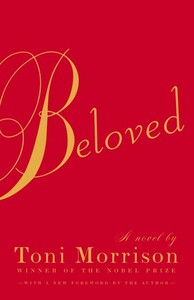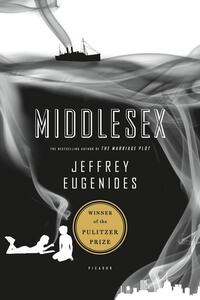You need to sign in or sign up before continuing.
Take a photo of a barcode or cover
manatad's Reviews (33)
hopeful
mysterious
reflective
medium-paced
Plot or Character Driven:
A mix
Strong character development:
Yes
Loveable characters:
Yes
Diverse cast of characters:
No
Flaws of characters a main focus:
No
This is a lovely little book. It's straightforward in its plot, making it easy to read. The prose and overall tone have a strange and peculiar feeling to them, but the book is short enough that it doesn't overstay its welcome. Perhaps best of all is the main character, Piranesi, who is a remarkably charming and adorable protagonist. The plot may be the weakest feature of the book, but the setting is definitely the strongest. Its descriptions of the ocean-drowned marble halls of the House are very vivid, memorable, and mystifying to me.
What I love the most about the book, and what I took to be its most important message, is how it inspires one to remember to experience life slowly and notice the beauty that is everywhere in the world. The way Piranesi marvels over the architecture of the House, the Statues, the birds and the sea life -- and how meditative these sections of the book are -- reminds me that this is the way I want to experience the world more often. No matter how lonely I feel, no matter what the situation is, there is always some form of beauty in my surroundings. All I need to do is slow down and look for it.
What I love the most about the book, and what I took to be its most important message, is how it inspires one to remember to experience life slowly and notice the beauty that is everywhere in the world. The way Piranesi marvels over the architecture of the House, the Statues, the birds and the sea life -- and how meditative these sections of the book are -- reminds me that this is the way I want to experience the world more often. No matter how lonely I feel, no matter what the situation is, there is always some form of beauty in my surroundings. All I need to do is slow down and look for it.
adventurous
dark
emotional
slow-paced
Plot or Character Driven:
A mix
Strong character development:
Yes
Loveable characters:
Yes
Diverse cast of characters:
No
Flaws of characters a main focus:
No
After recently rereading Watership Down (easily one of my favorite books of all time) I became interested in reading Richard Adams' other novels. I'll try not to draw too many comparisons between the two books because they are so different, but I will first say that The Plague Dogs is far more dark and contains pretty graphic descriptions of animals being tortured "in the name of science." Sensitive animal-lovers, beware.
This book was pretty slow at the start and for awhile I wasn't sure how to feel about it; however, I was very much enamored with the two main characters, Rowf and Snitter, from the beginning. I had not expected there to be such a large cast of human characters, and I wish I had paid more attention as they were each introduced. I did not, and as a result it was at times hard to distinguish one from the other. The humans' direct and indirect involvement with the dogs turns out to make up a large bulk of the novel, and unfortunately I did not find all of these sections of the book to be very interesting or fun to read.
That being said, about a quarter of the way through the book when the action really starts to pick up, I felt like I didn't want to put it down. The highlight is once again Adams' way of writing from the perspective of the animals. They are anthropomorphized just enough to be deeply sympathetic characters, but never to the point that you can forget that they really are just dogs. The book is exciting, emotional, and deeply reverant of animals and nature much in the same way that Watership Down is.
I think if I had found this book and read it as a child, I would have really loved it. It has some very dark and mature content, but is still simple to understand, straightforward in its plot, adventurous, and moving.
This book was pretty slow at the start and for awhile I wasn't sure how to feel about it; however, I was very much enamored with the two main characters, Rowf and Snitter, from the beginning. I had not expected there to be such a large cast of human characters, and I wish I had paid more attention as they were each introduced. I did not, and as a result it was at times hard to distinguish one from the other. The humans' direct and indirect involvement with the dogs turns out to make up a large bulk of the novel, and unfortunately I did not find all of these sections of the book to be very interesting or fun to read.
That being said, about a quarter of the way through the book when the action really starts to pick up, I felt like I didn't want to put it down. The highlight is once again Adams' way of writing from the perspective of the animals. They are anthropomorphized just enough to be deeply sympathetic characters, but never to the point that you can forget that they really are just dogs. The book is exciting, emotional, and deeply reverant of animals and nature much in the same way that Watership Down is.
I think if I had found this book and read it as a child, I would have really loved it. It has some very dark and mature content, but is still simple to understand, straightforward in its plot, adventurous, and moving.
Graphic: Animal cruelty
Moderate: Gore, Car accident
Minor: Animal death, Blood, Excrement
adventurous
slow-paced
Plot or Character Driven:
A mix
Strong character development:
Yes
Loveable characters:
Yes
Diverse cast of characters:
No
Flaws of characters a main focus:
No
I'm surprised by how much I enjoyed reading this novel. Hyperion felt so unique that I didn't think its sequel would be able to match it, but it turns out that I liked The Fall of Hyperion even more.
The two books are very different. Compared to the previous novel, this one has a much larger focus on the plot and setting rather than the characters and their backgrounds. It is therefore much more linear and reads like a typical novel with multiple points of view. As a result, the characters do not feel quite as distinct as before, but the universe they live in feels much more rich. I would say that the overall tone of the story is less mysterious and more action-packed.
There is a notable amount of padding in this book which serves to remind you of events from the previous novel. This might feel tedious and unnecessary if you were to start reading this book immediately after finishing the previous one.
What surprised me even more than my enjoyment of this novel was how emotional it made me. I shed tears and I laughed out loud. Any book that can make me do both of those things counts as a great one in my mind.
I didn't have the intention of moving on to read Endymion before I started this book, but I am considering it now. It doesn't feel like it is necessary to continue the series, but I've fallen in love with the worlds of the Hyperion Cantos and would really like to immerse myself in it again at some point in the future.
The two books are very different. Compared to the previous novel, this one has a much larger focus on the plot and setting rather than the characters and their backgrounds. It is therefore much more linear and reads like a typical novel with multiple points of view. As a result, the characters do not feel quite as distinct as before, but the universe they live in feels much more rich. I would say that the overall tone of the story is less mysterious and more action-packed.
There is a notable amount of padding in this book which serves to remind you of events from the previous novel. This might feel tedious and unnecessary if you were to start reading this book immediately after finishing the previous one.
What surprised me even more than my enjoyment of this novel was how emotional it made me. I shed tears and I laughed out loud. Any book that can make me do both of those things counts as a great one in my mind.
I didn't have the intention of moving on to read Endymion before I started this book, but I am considering it now. It doesn't feel like it is necessary to continue the series, but I've fallen in love with the worlds of the Hyperion Cantos and would really like to immerse myself in it again at some point in the future.
Graphic: Rape, Sexual assault, Violence
Moderate: Body horror, War
Minor: Pregnancy, Alcohol
dark
emotional
reflective
slow-paced
Plot or Character Driven:
Character
Strong character development:
Yes
Loveable characters:
Complicated
Diverse cast of characters:
No
Flaws of characters a main focus:
Yes
And here concludes yet another reread of a book I loved when I was a high school student. Unsurprisingly (as I have not been disappointed thus far), I think I enjoyed it just as much now as I did back then.
Frankenstein definitely reads "like an old book," which is to be expected from a novel originally published over 200 years ago. At the start, the plot crawls at a snail's pace, and we (the readers) have to endure with each introduction of a new character a whole chapter detailing their entire life story. This was a bit tedious even for me, and I consider myself to be a fairly patient reader. Fortunately, all necessary introductions are gotten out of the way in the first quarter of the novel, and the story builds from there into a tale that is equal parts thrilling, tragic, and spectacular.
I was able to appreciate something new during this second reading of Frankenstein that I do not recall having paid any attention to when I was younger, and that is the importance of the natural world in the context of the story: its beauty, its cleansing effect on the characters as a source of emotional release, and its symbolism as a reflection of their emotional lives. Nature seems to play an important role in the story, and some of my favorite quotes from the book describe the feelings evoked by immersing oneself in it.
"These sublime and magnificent scenes afforded me the greatest consolation that I was capable of receiving. They elevated me from all littleness of feeling, and although they did not remove my grief, they subdued and tranquilized it... The sight of the awful and majestic in nature had indeed always the effect of solemnizing my mind and causing me to forget the passing cares of life."
Of course, I can't wrap up my review without saying something about Frankenstein's monster. He might be one of my favorite villains in literature. He is highly sympathetic, sensitive, and intelligent; yet still undeniably fearsome and evil. It is very interesting to me that Mary Shelley chose to portray him as benevolent and gentle from the moment of his creation, asserting the belief that all people are born good. His subsequent abandonment and alienization are what make him truly become a monster, suggesting that outside forces mold the individual into what they are.
"Satan had his companions, fellow devils, to admire and encourage him, but I am solitary and abhorred."
Apparently, this novel is loaded with explicit references to Paradise Lost and The Rime of the Ancient Mariner, neither of which I have read, so this was all lost on me. In fact, I only learned of this recently when I was nearly finished with the book. I think if I were to read these two poems that influenced Shelley and return to Frankenstein again afterwards, I might be able to enjoy the book even more. I'll try to include them in my future reading plans.
I'm afraid I could only recommend this book to patient readers who are really interested in the classics, or lovers of gothic fiction. The beginning would probably be too much of a slog for most people to get through, although I think the payout is absolutely worth it. I would also say that this is a story that is more emotional and psychological than it is truly horrific, so try not to get into it with the wrong expectations. There is nothing grotesque or overtly disturbing (by today's standards, I guess) within this story.
Frankenstein definitely reads "like an old book," which is to be expected from a novel originally published over 200 years ago. At the start, the plot crawls at a snail's pace, and we (the readers) have to endure with each introduction of a new character a whole chapter detailing their entire life story. This was a bit tedious even for me, and I consider myself to be a fairly patient reader. Fortunately, all necessary introductions are gotten out of the way in the first quarter of the novel, and the story builds from there into a tale that is equal parts thrilling, tragic, and spectacular.
I was able to appreciate something new during this second reading of Frankenstein that I do not recall having paid any attention to when I was younger, and that is the importance of the natural world in the context of the story: its beauty, its cleansing effect on the characters as a source of emotional release, and its symbolism as a reflection of their emotional lives. Nature seems to play an important role in the story, and some of my favorite quotes from the book describe the feelings evoked by immersing oneself in it.
"These sublime and magnificent scenes afforded me the greatest consolation that I was capable of receiving. They elevated me from all littleness of feeling, and although they did not remove my grief, they subdued and tranquilized it... The sight of the awful and majestic in nature had indeed always the effect of solemnizing my mind and causing me to forget the passing cares of life."
Of course, I can't wrap up my review without saying something about Frankenstein's monster. He might be one of my favorite villains in literature. He is highly sympathetic, sensitive, and intelligent; yet still undeniably fearsome and evil. It is very interesting to me that Mary Shelley chose to portray him as benevolent and gentle from the moment of his creation, asserting the belief that all people are born good. His subsequent abandonment and alienization are what make him truly become a monster, suggesting that outside forces mold the individual into what they are.
"Satan had his companions, fellow devils, to admire and encourage him, but I am solitary and abhorred."
Apparently, this novel is loaded with explicit references to Paradise Lost and The Rime of the Ancient Mariner, neither of which I have read, so this was all lost on me. In fact, I only learned of this recently when I was nearly finished with the book. I think if I were to read these two poems that influenced Shelley and return to Frankenstein again afterwards, I might be able to enjoy the book even more. I'll try to include them in my future reading plans.
I'm afraid I could only recommend this book to patient readers who are really interested in the classics, or lovers of gothic fiction. The beginning would probably be too much of a slog for most people to get through, although I think the payout is absolutely worth it. I would also say that this is a story that is more emotional and psychological than it is truly horrific, so try not to get into it with the wrong expectations. There is nothing grotesque or overtly disturbing (by today's standards, I guess) within this story.
Minor: Suicide, Death of parent, Murder
dark
reflective
medium-paced
Plot or Character Driven:
A mix
Strong character development:
Yes
Loveable characters:
Complicated
Diverse cast of characters:
No
Flaws of characters a main focus:
Yes
"The best books... are those that tell you what you know already."
It was a pleasure (in its own special, stomach-churning way) to read this book again for the first time after nearly a decade. It is an undisputed classic, having introduced terms such as "doublethink," "thoughtcrime," and "Big Brother" to the global vocabulary, along with other themes that continue to feel relevant and eerily predictive of the world we live in today. It is George Orwell's nightmarish vision of the perfect totalitarian society.
I'm afraid I'm not able to say anything about 1984 that hasn't already been said at least a thousand times already, so I'll try to keep this as short as I can.
"It’s a beautiful thing, the destruction of words."
What I consider to be the most interesting theme in the book is the concept of language being utilized as a form of mind control against the general populace. This idea is explored through the invention of Newspeak, a mutilated form of the English language so restricted in its structure and vocabulary that it would render an individual unable to even think disobedient or illegal thoughts. Some of what were for me the most intriguing passages in the book were the ones related to Newspeak. It lead me to think a lot not only of language and its influence on our manner of thought and expression, but also of the realization that I believe the English language has naturally evolved to be more simple over the course of time. Additionally, Orwell's warnings about technology, surveillance, privacy, control of information, and alteration of history have all indeed emerged in one way or another as problems in the early 21st century.
If I could reasonably do so, I would recommend that everybody read this book. It is as thought-provoking as it is haunting. Simply an unforgettable novel.
It has also spurred in me an interest to reread the other two classic dystopian novels: Fahrenheit 451 and Brave New World, which I may make a goal of doing this year. I might even look into getting my hands on a copy of We by Yevgeny Zamyatin, a direct inspiration to Orwell which I have not read before.
It was a pleasure (in its own special, stomach-churning way) to read this book again for the first time after nearly a decade. It is an undisputed classic, having introduced terms such as "doublethink," "thoughtcrime," and "Big Brother" to the global vocabulary, along with other themes that continue to feel relevant and eerily predictive of the world we live in today. It is George Orwell's nightmarish vision of the perfect totalitarian society.
I'm afraid I'm not able to say anything about 1984 that hasn't already been said at least a thousand times already, so I'll try to keep this as short as I can.
"It’s a beautiful thing, the destruction of words."
What I consider to be the most interesting theme in the book is the concept of language being utilized as a form of mind control against the general populace. This idea is explored through the invention of Newspeak, a mutilated form of the English language so restricted in its structure and vocabulary that it would render an individual unable to even think disobedient or illegal thoughts. Some of what were for me the most intriguing passages in the book were the ones related to Newspeak. It lead me to think a lot not only of language and its influence on our manner of thought and expression, but also of the realization that I believe the English language has naturally evolved to be more simple over the course of time. Additionally, Orwell's warnings about technology, surveillance, privacy, control of information, and alteration of history have all indeed emerged in one way or another as problems in the early 21st century.
If I could reasonably do so, I would recommend that everybody read this book. It is as thought-provoking as it is haunting. Simply an unforgettable novel.
It has also spurred in me an interest to reread the other two classic dystopian novels: Fahrenheit 451 and Brave New World, which I may make a goal of doing this year. I might even look into getting my hands on a copy of We by Yevgeny Zamyatin, a direct inspiration to Orwell which I have not read before.
Graphic: Torture, Violence
Moderate: Sexual content, Alcohol, War
Minor: Rape
adventurous
dark
mysterious
tense
slow-paced
Plot or Character Driven:
Character
Strong character development:
Yes
Loveable characters:
Yes
Diverse cast of characters:
No
Flaws of characters a main focus:
Yes
It's hard for me to say much except that I was surprisingly enraptured by this novel. I wish I could have taken the time to read it more slowly and savor it, but I had borrowed it off Libby and needed to finish it within the span of three weeks.
Hyperion was very different from the other books I have read so far this year. The main plot taking place within the present timeline of the novel takes more of a secondary role compared to the backstories of each of the seven main characters, whose personal vignettes make up the bulk of the novel. Each of these embedded narratives is written in a different style and tone, each one as distinct as the character it is associated with. Gradually, the mysteries of the main characters' motivations, the interstellar society they come from, and the dark entity awaiting their arrival on the planet Hyperion, are revealed to us readers before the narrative cuts off abruptly at the end of the book, making it necessary to read the sequel if one wishes to see the story to its conclusion.
I wasn't as bothered by the ending as my previous statement may imply because I found the entire book to be thoroughly enjoyable on its own. I think that the prose of the novel, particularly during the "Hyperion Cantos" section, feels consistently inspired, and I appreciate the numerous references to modernist poetry and classical epics. Dan Simmons explains just enough about the science and mechanics of his fictional universe to leave me feeling intrigued and not bored or very stupid. (I'm not even going to pretend I know enough about physics to tell the difference between what's real and what's speculative in these older science fiction novels.) And best of all, his descriptions of the various planets visited throughout the book, from their unique flora and fauna to the color of their skies, inspired so much wonder in me.
This is definitely a book that I think would benefit from a second reading by me at some point in the future. I'd like to spend more time thinking over what the strongest and weakest aspects of the story are, and to notice if there was anything I missed or glazed over on my brisk first read. Overall, I thought it was a refreshing novel, but I'm not sure precisely what kind of person I would recommend it to. I think there may be a glint of true literary merit to be seen here, but I couldn't recommend this book to anyone who isn't a true sci fi/space opera lover.
Hyperion was very different from the other books I have read so far this year. The main plot taking place within the present timeline of the novel takes more of a secondary role compared to the backstories of each of the seven main characters, whose personal vignettes make up the bulk of the novel. Each of these embedded narratives is written in a different style and tone, each one as distinct as the character it is associated with. Gradually, the mysteries of the main characters' motivations, the interstellar society they come from, and the dark entity awaiting their arrival on the planet Hyperion, are revealed to us readers before the narrative cuts off abruptly at the end of the book, making it necessary to read the sequel if one wishes to see the story to its conclusion.
I wasn't as bothered by the ending as my previous statement may imply because I found the entire book to be thoroughly enjoyable on its own. I think that the prose of the novel, particularly during the "Hyperion Cantos" section, feels consistently inspired, and I appreciate the numerous references to modernist poetry and classical epics. Dan Simmons explains just enough about the science and mechanics of his fictional universe to leave me feeling intrigued and not bored or very stupid. (I'm not even going to pretend I know enough about physics to tell the difference between what's real and what's speculative in these older science fiction novels.) And best of all, his descriptions of the various planets visited throughout the book, from their unique flora and fauna to the color of their skies, inspired so much wonder in me.
This is definitely a book that I think would benefit from a second reading by me at some point in the future. I'd like to spend more time thinking over what the strongest and weakest aspects of the story are, and to notice if there was anything I missed or glazed over on my brisk first read. Overall, I thought it was a refreshing novel, but I'm not sure precisely what kind of person I would recommend it to. I think there may be a glint of true literary merit to be seen here, but I couldn't recommend this book to anyone who isn't a true sci fi/space opera lover.
Graphic: Sexual content, Violence
Moderate: Body horror, Cursing, Alcohol, War
Minor: Death, Drug use, Torture, Medical content
challenging
dark
emotional
reflective
sad
slow-paced
Plot or Character Driven:
A mix
Strong character development:
Yes
Loveable characters:
Complicated
Diverse cast of characters:
No
Flaws of characters a main focus:
Yes
This is a well-written, funny, and delightful book, but not exactly what I'm looking for or interested in reading right now.
emotional
reflective
slow-paced
Plot or Character Driven:
A mix
Strong character development:
Yes
Loveable characters:
Yes
Diverse cast of characters:
Yes
Flaws of characters a main focus:
Yes
I had read this book once before nearly ten years ago and absolutely loved it. For some reason I wasn't sure if it would hold up as well for me today, but I have to say I enjoyed it almost equally as much.
I think this is an ambitious novel. The blending of the generational family saga and (fictional) memoir within one book reminds me somewhat of John Steinbeck's East of Eden, as does its similarly slow-paced and rambling style (which I love); however, there are just a few areas where the novel fell short for me.
There are several historical events interjected within the story, and the characters' involvement with them did not always feel natural or cohesive with the rest of the plot. A couple of these moments were a bit jarring for me as a reader. Jeffrey Eugenides's prose is also a bit too flowery for my usual taste. For the most part, I loved his writing (Obviously, otherwise I would not have enjoyed the novel at all.) but there were several instances where I had some difficulty interpreting his metaphorical use of language, especially during descriptions, and found it necessary to look up a photo of what was being described. (One may simply attribute this to my own poor reading comprehension.) And unfortunately, the many heartfelt descriptions of the city of Detroit were mostly lost on me because I have never been there.
This last bit is purely my own personal preference: I don't very much enjoy media about awkward teenagers, and this was largely what the second half of the book was made of. I was a teenager when I read this book for the first time and must have found it all relatable, but reading it again forced me to remember all of the tumultuous emotions, insecurities, infatuations, and humiliations I had to endure at that age. It was at times a bit uncomfortable for me, to be perfectly honest.
This is not entirely a bad thing from my point of view, though. I appreciate the blunt honesty of Eugenides's writing and his willingness to describe even the uncomfortable moments of life using his graceful, sensual prose. And while I personally wasn't able to visualize his beloved Detroit, my imagination flourished in his descriptions of the places I am more familiar with.
I think that Middlesex is an immigrant story at its heart, and this is my favorite thing about the novel. Maybe I'm biased, being the child of an immigrant myself, but I do believe this. Eleutherios and Desdemona's story, which was completely unrelatable and without context for me during my first read, was so compelling to me this time around. I just loved this section of the book. And the way that those two, with their children and grandchildren, try to maintain their Greek roots through the generations speaks to me as well. It's harder for me to articulate my feelings here because there is emotion involved, so suffice it to say that I see a resemblance in my own life and upbringing.
I would love to recommend this book to my friends. It has many interesting themes relating to gender identity and transformation, and it contains numerous allusions to Greek mythology. It is a deeply intimate and thoughtful story, and I think that the author, not being an intersex man himself, shows great sensitivity and empathy in his depiction of the character, Cal. I did not feel that there was anything manipulative or exploitative about this book. To me, it was a story full of love.
I think this is an ambitious novel. The blending of the generational family saga and (fictional) memoir within one book reminds me somewhat of John Steinbeck's East of Eden, as does its similarly slow-paced and rambling style (which I love); however, there are just a few areas where the novel fell short for me.
There are several historical events interjected within the story, and the characters' involvement with them did not always feel natural or cohesive with the rest of the plot. A couple of these moments were a bit jarring for me as a reader. Jeffrey Eugenides's prose is also a bit too flowery for my usual taste. For the most part, I loved his writing (Obviously, otherwise I would not have enjoyed the novel at all.) but there were several instances where I had some difficulty interpreting his metaphorical use of language, especially during descriptions, and found it necessary to look up a photo of what was being described. (One may simply attribute this to my own poor reading comprehension.) And unfortunately, the many heartfelt descriptions of the city of Detroit were mostly lost on me because I have never been there.
This last bit is purely my own personal preference: I don't very much enjoy media about awkward teenagers, and this was largely what the second half of the book was made of. I was a teenager when I read this book for the first time and must have found it all relatable, but reading it again forced me to remember all of the tumultuous emotions, insecurities, infatuations, and humiliations I had to endure at that age. It was at times a bit uncomfortable for me, to be perfectly honest.
This is not entirely a bad thing from my point of view, though. I appreciate the blunt honesty of Eugenides's writing and his willingness to describe even the uncomfortable moments of life using his graceful, sensual prose. And while I personally wasn't able to visualize his beloved Detroit, my imagination flourished in his descriptions of the places I am more familiar with.
I think that Middlesex is an immigrant story at its heart, and this is my favorite thing about the novel. Maybe I'm biased, being the child of an immigrant myself, but I do believe this. Eleutherios and Desdemona's story, which was completely unrelatable and without context for me during my first read, was so compelling to me this time around. I just loved this section of the book. And the way that those two, with their children and grandchildren, try to maintain their Greek roots through the generations speaks to me as well. It's harder for me to articulate my feelings here because there is emotion involved, so suffice it to say that I see a resemblance in my own life and upbringing.
I would love to recommend this book to my friends. It has many interesting themes relating to gender identity and transformation, and it contains numerous allusions to Greek mythology. It is a deeply intimate and thoughtful story, and I think that the author, not being an intersex man himself, shows great sensitivity and empathy in his depiction of the character, Cal. I did not feel that there was anything manipulative or exploitative about this book. To me, it was a story full of love.
Graphic: Incest
Moderate: Sexual content, Medical content
Minor: Drug use, Racism, Violence, Car accident, Death of parent, Alcohol, War

